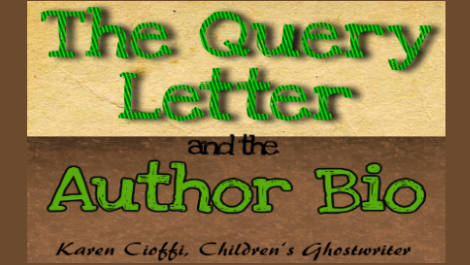I read an interesting article by Robert Lee Brewer, senior content editor at the Writer’s Digest writing community. It talked about the author bio in your query and book proposals.
According to Brewer, the bio “is a part of the query that has more potential to harm a pitch than to help.” (1)
Okay, if you weren’t scared of the query letter before, you probably are now!
Well, don’t fret too much; here is a list of Dos and Don’ts to watch out for:
1. Even if your pen name is different than your legal (check cashing and income tax) name, include your pen name in your bio (your byline).
To simplify this, the name on your manuscript is the one you put in the query.
Brewer advises that it cuts down on confusion and possible author name errors.
For example, my pen name is my maiden name. It is not my legal name. But all my online writing and books are under my pen name. So, that’s the name I would use for my bio in a query or book proposal.
2. Know what name you’ll be using as your byline before submitting the query.
This is the same for a pseudonym. Use the name you’re writing under for the book you’re querying.
If there’s interest in your manuscript, there will be plenty of time to discuss the details.
3. If you have publication credits, include them. They must be relevant to the book you’re pitching, though.
For example, you might be a kindergarten teacher and write tips for a local newspaper or magazine dealing with handling that age group. If you’re submitting a picture book geared toward the same age group, that’s relevant to the book you’re pitching.
If you’re a fitness trainer and writer for an online fitness magazine, you would mention it if your book is relevant to fitness.
4. Avoid including insignificant publication credits.
Brewer mentions an example of having a poem published in your high school magazine. While you and your family may be proud of that fact, the publisher will not be.
5. If you have relevant experience in regard to the manuscript you’re pitching, include it. Keep in mind it must be a professional experience.
We can go back to the kindergarten teacher. If the story is about that age group, her occupation is definitely relevant to the book.
If you were an Olympic finalist or even a member on an Olympic team, and you’re writing a story about achieving goals, your professional experience is relevant to the book.
6. Don’t mention that this is your first manuscript and you’re new to writing.
But what if you don’t have any credits or professional background relevant to the story you’re pitching?
Literary agent Rachelle Gardner suggests, “If you’re a member of a writers’ organization such as SCBWI, ACFW or ASJA, you can mention it.” (2) You can also mention and should mention if you have a degree in literature or writing.
That’s what I did when I first submitted queries. Not having any relevant publications or professional experience, I mentioned the writing organizations I was affiliated with at the time.
7. You can include information about your marketing reach, such as Facebook, Instagram, Twitter, or other social networks where you have LOTS of followers. If you have 10,000 or more connections of this kind, that can be significant to your pitch.
Agents and publishers like to know that an author, even a new author, can help sell their books.
8. Don’t include self-praise: “My book is the greatest thing since the Bible.” And don’t mention that you think your children’s book will be great as a Disney movie.
The acquisitions editor or agent will determine for herself whether your story is worth her time, effort, and money.
9. Keep it short and sweet. Gardner mentions 50 words or less for a fiction story and longer for nonfiction. For the nonfiction, you want to convey your qualifications in this instance.
10. Always be professional and thank the agent or editor for their time and consideration.
Brewer says, “When in doubt, leave it out.”
For more about the author bio and the query letter, check out the referenced articles:
(1) http://blog.writersmarket.com/whats-new/include-exclude-author-bios
(2) https://rachellegardner.com/how-to-write-a-terrific-author-bio/

I’m a working children’s ghostwriter, rewriter, and coach. I can help turn your story into a book you’ll be proud to be the author of, one that’s publishable and marketable.
OTHER HELP I OFFER:
HOW TO WRITE A CHILDREN'S FICTION BOOK
A DIY book to help you write your own children’s book.
FICTION WRITING FOR CHILDREN eCOURSE
4-Weeks / 8 Sections Guided Self-Study Mentoring Program
You can contact me at kcioffiventrice@gmail.com.

A Guide to Writing a Relatable Children’s Story
Book Reviews – Things You Should Know
Author Expectations and Reality


1 thought on “The Query and the Author Bio”